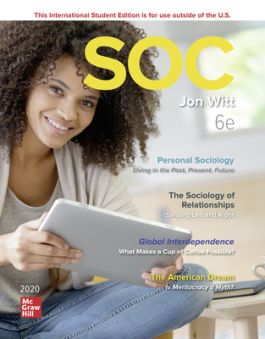SOC 2020 ISE
To access your eBook, sign in or register at McGraw Hill Bookshelf and you will be instructed to enter your access code.
After adding your eBook to the McGraw Hill Bookshelf, download the ReadAnywhere app on the App Store or Google Play. Sign into your McGraw Hill Bookshelf or Connect account to access your eBook on the go and download chapters for offline reading.
For McGraw Hill eBook & ReadAnywhere support, click here.
1. The Sociological Imagination
2. Sociological Research
3. Culture
4. Socialization
5. Social Structure and Interaction
6. Deviance
7. Families
8. Education and Religion
9. Government and Economy
10. Social Class
11. Global Inequality
12. Gender and Sexuality
13. Race and Ethnicity
14. Population, Health, and Environment
15. Social Change
McGraw Hill Connect is an award-winning digital teaching and learning solution that empowers students to achieve better outcomes and enables instructors to improve course management efficiency.
High-Quality Course Material
Our trusted solutions are designed to help students actively engage in course content and develop critical higher-level thinking skills while offering you the flexibility to tailor your course to the ways you teach and the ways your students learn.
Assignments & Automatic Grading
Connect features a question bank that you can select from to create homework, practice tests and quizzes. Dramatically reduce the amount of time you spend reviewing homework and grading quizzes, freeing up your valuable time to spend on teaching.
Analytics & Reporting
Monitor progress and improve focus with Connect’s visual and actionable dashboards. Reports are available to empower both instructors and students with real-time performance analytics.
Seamless Integration
Link your Learning Management with Connect for single sign-on and gradebook synchronization, with all-in-one ease for you and your students.


